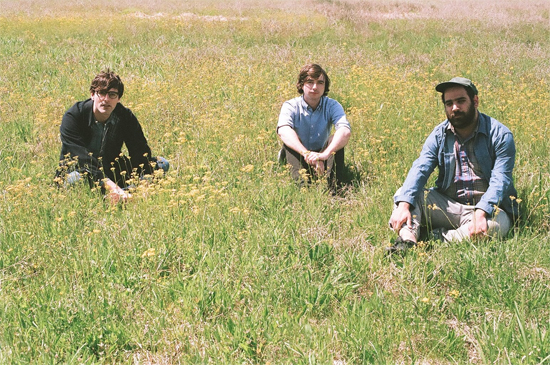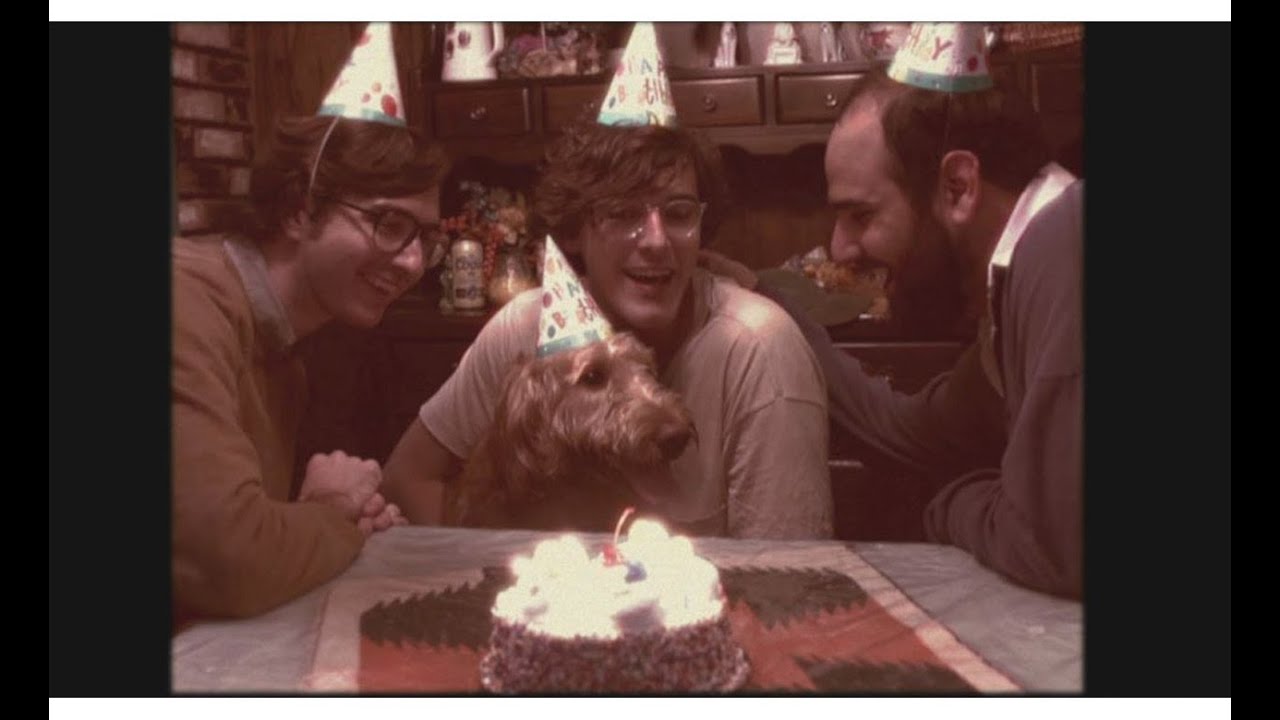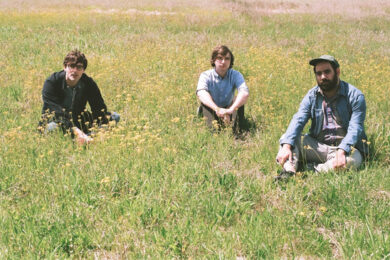The tiniest details can trigger a memory surge. When on R.E.M’s ‘Nightswimming’, Michael Stipe sings “Every streetlight a reminder” he delivers a little gut punch of nostalgia. He appreciates that it’s the small things; the dog-eared photo, the light at a certain time of day or a snippet of a long forgotten song.
Much of Days, Real Estate’s excellent second album, sounds steeped in fondness for past happiness. Like Stipe, singer Martin Courtney is stirred by the minutiae of experience. When he remembers “All those aimless drives” on album standout ‘Green Aisles’ he is evoking memories of his formative years in the idyllic-sounding Ridgewood, a leafy suburb in upstate New York.
Real Estate – Courtney, plus Matt Mondanile (who also records as Ducktails) on guitar and bassist Alex Bleeker – are all childhood friends. Having gone separate ways during their college years, they regrouped back in New Jersey and decided to form Real Estate in 2007. After releasing an eponymous debut album in 2009, the band then decided to work with long-time acquaintance Kevin McMahon (who’d produced albums for The Walkmen and fellow New Jerseyians Titus Andronicus) on Days.
The resultant record is gorgeous – Days is rich in Kodachrome memories and classic guitar structures, inspired by a unanimous love of “melodic songwriting” and a desire to make use of the privileges available to them. Real Estate, and principle songwriter Courtney in particular, do not have a vast well of angst to draw upon. They come across as three well-adjusted twenty-somethings who are determined to make the most of their education and connections.
We meet in a converted mill-cum-arts centre in Salford. Both Bleeker and Mondanile are affable, if a little distracted, as a stream of people interrupt our flow. When Courtney arrives a few minutes later, he seems more introverted and less at ease with being interviewed. That night’s sold-out show is hugely impressive. With the trio bolstered by drummer Jackson Pollis and keyboard player Jonah Maurer, Real Estate power through an hour long set, with new songs receiving the same ecstatic reaction as old favourites from a crowd described by one punter as a collection of “beards, frames and skinny jeans.”
I believe the recording of Days took place in a barn in a place called New Paltz. Why a barn in the winter?
Alex Bleeker: Well, it was February through to June. It’s really pretty there, and we didn’t want to be distracted by girlfriends and parties and whatever else. We [initially] spent a whole week up in the barn, just tracking and getting a feel for the record and that felt like the big, initial push and then we would go for a couple of days at a time.
How did the making of Days compare to your debut album?
AB: Days was recorded as an album, as opposed to bit and pieces. The other one came together like a compilation of all the songs we could put together on a record. Days sounds like more of a whole composition than the first record. We didn’t want it to be purposefully lo-fi or purposefully hi-fi – we just wanted everything to be heard clearly and nicely and wanted it to sound good.
Matt Mondanile: Also, it didn’t start out as a blank slate – we were playing a lot of new songs live, so by the time we got down to recording the album we had a list of about a dozen songs. Martin had all the stuff written out. Laying over textures and sounds was the most creative aspect of the recording process.
The album was recorded with Kevin McMahon and was your first time with a ‘proper’ producer. What made you choose Kevin?
AB: We’d known him a long time. Martin used to be in a band in high school with him, so we had some history with him – I used to intern for him at one point. It was a pretty big step for us to go to a more professional brand of studio, but it was a good step for us because it was with someone we knew. It wasn’t going to be super on-the-clock. It wasn’t like a shiny, chromed-out kinda LA studio. It was very nice gear and a higher fidelity than we are used to recording, but we still slept together in a barn.
And what impact did Kevin have on the way Days ended up sounding?
Martin Courtney: He nailed the sound that we wanted and described to him, which was a timeless, classic rock sound. He also pushed us to keep recording to pretty much make sure we were at our peak. It took me two weeks to get the vocals down and he would make me sing over and over. It was like he was forcing me and we would end up with 20 takes. But he was like a coach, pushing us harder. We’d never had that experience before because we had always recorded ourselves or done it with friends.
The album seems steeped in nostalgia for Ridgewood, the town you all grew up in. For those that don’t know Ridgewood, what sort of place is it?
MM: It’s a suburb of New York. It’s where we grew up and played in a lot of bands there. It’s a middle-sized, middle class town.
AB: Ridgewood is a very nice place to live; beautiful tree-lined streets and close proximity to New York. It has a very good public school system and that’s the reason why a lot of people live there. There are lots of extra-curricular [activities] and stuff like that.
That sounds like a wonderful place. Sometimes, here in the UK there is a sense of embarrassment in coming from a town like that, as if you have to apologise for a privileged upbringing.
AB: I don’t feel that liberal guilt is useful. There is affluence in Ridgewood – no question about it. I don’t feel the need to apologise for where I come from. I feel the need to take advantage of it, because I am getting a lot of opportunities based on where and to whom I was born. So, I don’t just want to sit around watching TV all the time.
At this point we are interrupted. The journalist from the band’s previous interview would now like some photographs, while we are already running late for their next passive grilling.
So, where are you on the interview scale? Are you bored shitless by them yet?
AB: Yes, but this one is going alright though. With some people I am less talkative. It’s not anybody’s fault who is interviewing us, but if you do five in a day you feel like you are turning into a machine. It’s a good problem to have. If nobody liked the music, we’d never do have to do an interview again.
So, back to my interview; a number of songs also seem to reflect very fond memories from your childhood. Was this fuelled by a bout of ‘tour homesickness’ or is there something deeper than that?
MC: The homesickness thing is definitely part of it and makes itself into a couple of songs on the album – writing from a ‘being on tour’ perspective. But it’s easiest for me to write about who we are and where we are from and I find that fits the music pretty well. I didn’t have a shitty time growing up, so whatever I write about is never going to be so terrible. We have a lot of shared memories and it makes sense to have that in our lyrics.
AB: I think Martin was searching back into his childhood to make some sort of grand understanding of it. He also went back to when we all came back from college and had cars and a little bit more independence, but we were still in this bubble and he just remembers it really fondly – and so do I.
Is there a sense that nostalgia may also be triggered by a sense of confusion which can accompany people in their mid-to-late twenties? I apologise for the amateur psychology embedded in that question.
MC: That does make sense. There is a huge confusion at that age. I’m lucky enough to be doing this and I don’t know what else I would want to do. I think we focus on the past, because I don’t think I have anything left to write about ‘the now’. The present, to me, is not as interesting as it is just confusing. I think it is a very confusing time, your twenties, and is this band were to dissolve, I’d be confused all over again.
You have known each other for over a decade. If we created a Venn diagram of your favourite bands, which ones would be in the overlapping section?
AB: Fleetwood Mac, Animal Collective, Pink Floyd, Kurt Vile and War On Drugs; definitely Neil Young, for sure. I really like Girls but I am not sure they would get in the Venn diagram.
I ask because I’ve never been in a band and I’m always fascinated by how bands ‘settle’ on a sound. How early did you decide what Real Estate would initially sound like?
AB: Mine, Matt and Martin’s tastes were towards pleasant, melodic songwriting. We had gone to college, so only saw each other in the summers and would then play together. When we finished college, we had all this time so we started this band. Friends of ours were in bands that had become popular, so we thought there maybe something in this realm of possibility. When we played, we returned to what brought us together in the first place, like early nineties indie – Pavement and Yo La Tengo. So that’s why we sound like we do – it is a return to the bands that brought us together in the first place.
The album artwork for Days features a beautiful photograph by [American conceptual artist] Dan Graham. Why did you choose that particular image?
MM: The picture is from one of his exhibitions in New York. We are all fans of his art, so we thought it would be really cool to use one of his photos of houses for the cover.
AB: He is from New Jersey and the photo is taken in the same county we grew up in, so it all kind of fit together.
As for the future, what might we expect from Real Estate’s third album?
MC: Well, I feel like all the songs on Days don’t sound that similar, but as a whole it has a vibe. We are always going to come up with new ideas for arrangements, but, in general, if there is anything I think we will begin to complain that we sound the same all the time. At the moment this is our style.
So how did I do? Are you going to give me a Pitchfork-style rating as an interviewer?
AB: Good. You were like an 8.2.
Real Estate play London’s Scala tonight, Tuesday 6th December




